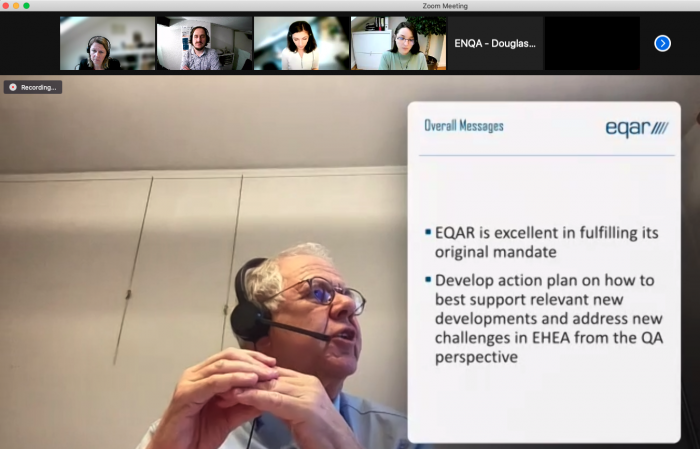
Members’ Dialogue discusses EQAR’s evaluation results
Following the site visits and interviews of the expert Panel in the autumn of 2021, the final External Evaluation Report has been published.
The report, including other information related to the current (and previous) evaluation, can be found on our webpage about the Evaluation of EQAR.
EQAR members discussed the various outcomes and recommendations suggested by the Panel at the EQAR Member’s Dialogue, which took place online on 3-4 February. The Member’s Dialogue was not only devoted to the external evaluation results, but also reflected on the QA of alternative providers and the inclusion of micro-credential providers in DEQAR. Members’ input on these last two topical subjects is crucial for both the Register and DEQAR.
Have a look at the agenda (including recordings) of the EQAR Member’s Dialogue
Apropos the external evaluation, members commended the overall positive evaluation by the Panel, who described EQAR as “one of the most successful pan-European organizations in higher education”. The Panel’s conclusion that EQAR is excellent in fulfilling its original mandate, as a “reliable, trustworthy, independent register that plays an important role in securing a credible QA system in EHEA”, is equally heartening for EQAR members, committee members, the Secretariat and last but not least, the President.
There is of course always room for improvement and development. The Panel concurred with many opportunities for enhancement that had also been identified in the Self-Evaluation Report.
The Panel highlighted the following areas (for improvement) which were discussed at the EQAR Members’ Dialogue:
- The Panel recommended enhancing the efficiency of the review and registration process, and improve the communication between EQAR and the agency review panels.
- The Panel underlined that several challenges remain with regard to cross-border QA in the EHEA and HEIs being able to work with a QAA from another country.
- The Panel recognised DEQAR as an initiative that is held in very high regard by our stakeholders and that advanced EQAR’s role significantly. The Panel recommended that we review how DEQAR could be better tailored to different user profiles and that we define clear and measurable indicators of success for the future.
- The Panel highlighted that EQAR disposes of great expertise in the area of quality assurance and that this expertise is invaluable to policy-makers.
- The Panel recognised that new trends and developments are changing the shape of the EHEA, which indeed could not have been anticipated when EQAR was set up.
These discussions will feed into the EQAR Strategy 2023-2027, to be adopted by the General Assembly of 2023.
The process of EQAR’s external evaluation started in October 2020 with the Call for Tender for the Coordination of the External Evaluation of EQAR and the first meeting of the Self-Evaluation Group. Yehuda Elkana Center for Higher Education (CEU YECHE) was selected as coordinator for the EQAR external evaluation in December 2021. Find out more about the timeline, the coordinator and the Panel.